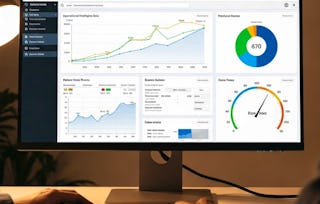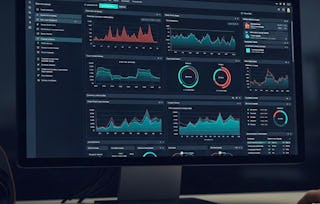By the end of this course, learners will be able to define Splunk knowledge objects, implement lookups, apply regex and delimiter-based field extractions, execute workflow actions, categorize data with tags and event types, design automated alerts, manage scheduled reports, develop dashboards, create reusable macros, and build accelerated data models with pivot visualizations.

Splunk Knowledge Objects: Analyze & Visualize Data

Splunk Knowledge Objects: Analyze & Visualize Data
This course is part of Splunk Analytics & Visualization: From Data to Insights Specialization

Instructor: EDUCBA
Access provided by Micron Technology
What you'll learn
Create and manage Splunk knowledge objects and data models.
Implement lookups, regex extractions, and workflow actions.
Build automated alerts, dashboards, and pivot visualizations.
Skills you'll gain
- Unstructured Data
- Statistical Reporting
- Dashboard
- Data Transformation
- Taxonomy
- Data Integration
- Data Modeling
- Splunk
- Data Visualization Software
- Event Monitoring
- Continuous Monitoring
- Data Wrangling
- Data Manipulation
- Pivot Tables And Charts
- Text Mining
- Data Analysis Expressions (DAX)
- Role-Based Access Control (RBAC)
- Scheduling
- Management Reporting
- Workflow Management
- Skills section collapsed. Showing 11 of 20 skills.
Details to know

Add to your LinkedIn profile
20 assignments
November 2025
See how employees at top companies are mastering in-demand skills

Build your subject-matter expertise
- Learn new concepts from industry experts
- Gain a foundational understanding of a subject or tool
- Develop job-relevant skills with hands-on projects
- Earn a shareable career certificate

There are 5 modules in this course
This module introduces learners to the concept of Splunk knowledge objects, permissions, and the foundational role of lookups. Participants explore how knowledge objects enrich raw data, manage access, and provide consistent structures for efficient analysis.
What's included
12 videos4 assignments
This module focuses on extracting fields from raw events using regex and delimiters, and enhancing searches with workflow actions. Learners practice parsing unstructured data and applying workflow actions to integrate Splunk with external systems.
What's included
12 videos4 assignments
This module covers workflow search actions, tagging strategies, and event types for better classification of Splunk data. It also introduces alert fundamentals, enabling learners to detect, categorize, and respond to event conditions.
What's included
12 videos4 assignments
This module enables learners to manage scheduled reports, design dashboards, and apply Splunk macros for efficient query reuse. Participants gain practical skills in reporting automation, dashboard visualization, and macro-driven search optimization.
What's included
12 videos4 assignments
This module dives into Splunk data models, hierarchies, transactions, and pivots to create advanced analytical structures. Learners enhance reporting by leveraging accelerated data models and pivot visualizations to uncover actionable insights.
What's included
16 videos4 assignments
Earn a career certificate
Add this credential to your LinkedIn profile, resume, or CV. Share it on social media and in your performance review.
Why people choose Coursera for their career

Felipe M.

Jennifer J.

Larry W.






